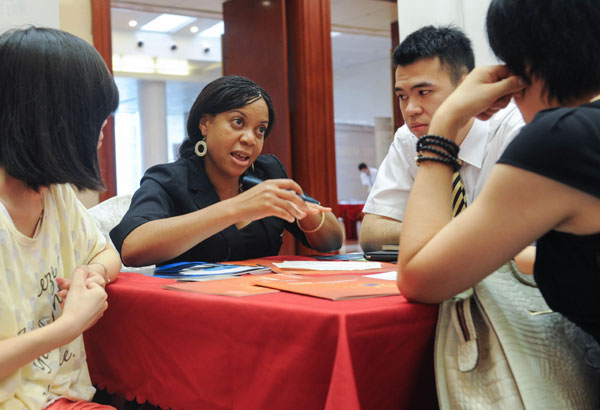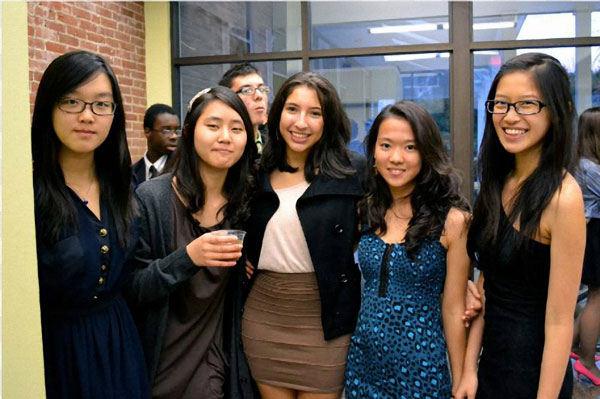Foreign schools give a valuable lesson
Updated: 2012-07-10 08:09
By Luo Wangshu (China Daily)
|
||||||||
Contacts, prestige and a solid education can be a class act, Luo Wangshu reports in Shanghai.
 |
|
An overseas-education counselor (second from left) talks to students and parents at an international education exhibition in Hangzhou, Zhejiang province on June 24. Representatives of well-known schools, colleges and universities from more than 30 countries attended the exhibition. Han Chuanhao / Xinhua |
Tina Shan's beautifully tanned face glowed with enthusiasm as she talked about her two years at Concord Academy, a private school in Massachusetts in the United States.
"My mom's idol is Jacqueline Kennedy and she always says she never imagined she would be able to send her daughter to the school 'Jackie' attended. The connection makes her feel really great," said the 17-year-old from Shanghai.
Shan is also thrilled at the people whose paths cross hers. "After taking the exam to enter Concord, I went to the cinema and watched 2012. I didn't imagine that I would end up as a schoolmate of the daughter of one of the stars. The daughter of Oliver Platt, who played a Russian billionaire in the movie, is my classmate," she said.
 |
|
Tina Shan (second from right) and her friends stand outside the dining hall as they wait for a formal buffet to begin at Concord Academy, a private school in Massachusetts. Tradition dictates that the students dress formally to attend the monthly event. Provided to China Daily |
Through the exclusive school, Shan also shares connections with Drew Gilpin Faust, president of Harvard University, Queen Noor of Jordan and other notable alumni.
Those connections come at a price, though. The fee for boarding students at Concord is $48,000 during the 2011-12 school year, but Shan's parents are unlikely to miss the money. Her father owns a real estate company, and her mother used to run an international trading business. Originally from Wenzhou in East China's Zhejing province, a hotbed of private industry in the 1980s, the couple moved to Shanghai, many years ago.
Shan and her peers are part of a growing trend among wealthy Chinese parents to send their children to elite secondary schools. The parents may have worked their way up from the bottom of a developing nation, but want their children to have international skills and gain entry to the global elite.
At Eton College in the UK, which counts Princes William and Harry among its alumni, Chinese students make up the second-largest group among international scholars, after those from the US, according to headmaster Tony Little.
At the Webb School in California, whose motto is "Leaders, not ordinary men", the number of applications from Chinese students has risen fourfold since 2006, said Leo Marshall, director of admission and financial aid.
These Chinese students mainly come from three distinct family types: they are the children of political leaders, business people - the largest group - and professionals, especially those with academic strengths, such as college professors. They are the new kids on the block, but their numbers are growing, said Eton's Little.
Moreover, 80 percent of Chinese millionaires plan to send their children to study overseas, according to research conducted earlier this year by the Hurun Research Institute. Among the super-wealthy, such as billionaires, the number rises to more than 90 percent. In the past five years, the super-wealthy have started to send their children abroad at a younger age, sometimes as young as 13, and they are fascinated by elite schools.
Shan said she was only the second student from the Chinese mainland to gain admission to Concord Academy, but the year she entered the school, 2010, three other children from the Chinese mainland arrived and became her schoolmates.
"The largest national group among the international students used to be Korean, there were around 30. But now, Chinese students have taken the top spot. The numbers include those from outside the Chinese mainland, places such as Hong Kong and Taiwan, as well as some first-generation children of emigres, who hold American passports but still reside in China," said Shan.
"The Chinese parents have seen the international opportunities. They are the first generation with global vision and they send their second- and third-generations to study overseas to gain international skills," said Rupert Hoogewerf, founder of the Hurun Research Institute.
Eton has good academic results and its students regularly gain admission to the top universities, according to Little. However, the school aims to provide a rounded and high-quality education, and not just good exam grades. "Eton is not an exam factory," said Little. "Instead, we care about whether our students will suit all environments and take all the opportunities open to them."
The students are expected to spend time on a range of non-exam-related compulsory courses, such as philosophy and music. They study six days a week, but on Tuesdays, Thursdays and Saturdays, school finishes at lunchtime and the students engage in a range of outside activities and sports. Also, all students have to play a team sport. "That's how they learn team work," said Little.
Marshall from the Webb School said that its current crop of Chinese students are top performers, and are set to follow in the footsteps of previous generations who gained admission to elite universities such as John Hopkins and UCLA.

 Relief reaches isolated village
Relief reaches isolated village
 Rainfall poses new threats to quake-hit region
Rainfall poses new threats to quake-hit region
 Funerals begin for Boston bombing victims
Funerals begin for Boston bombing victims
 Quake takeaway from China's Air Force
Quake takeaway from China's Air Force
 Obama celebrates young inventors at science fair
Obama celebrates young inventors at science fair
 Earth Day marked around the world
Earth Day marked around the world
 Volunteer team helping students find sense of normalcy
Volunteer team helping students find sense of normalcy
 Ethnic groups quick to join rescue efforts
Ethnic groups quick to join rescue efforts
Most Viewed
Editor's Picks

|

|

|

|

|

|
Today's Top News
Health new priority for quake zone
Xi meets US top military officer
Japan's boats driven out of Diaoyu
China mulls online shopping legislation
Bird flu death toll rises to 22
Putin appoints new ambassador to China
Japanese ships blocked from Diaoyu Islands
Inspired by Guan, more Chinese pick up golf
US Weekly

|

|






